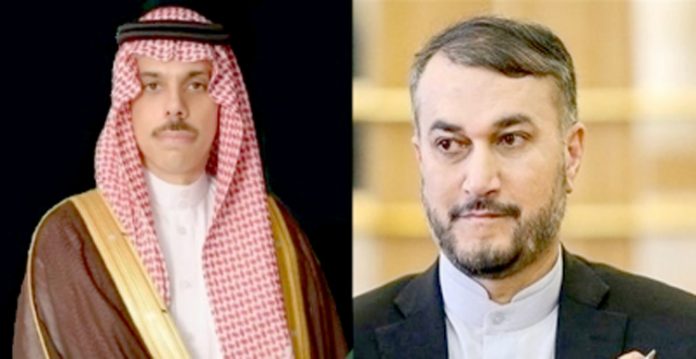Iranian Foreign Minister Hossein Amir-Abdollahian and his Saudi counterpart Prince Faisal bin Farhan Al Saud have agreed to meet at the earliest opportunity to prepare the ground for the reopening of embassies and consulate generals between the two countries, the Foreign Ministry in Tehran announced on Thursday.
The two Ministers discussed the issues in a phone call to congratulate each other on the starting of the Muslim fasting month of Ramadan, Xinhua news agency quoted the Ministry as saying.
The Saudi Foreign Minister pointed to the positive achievements of the Beijing meeting, in which the two countries signed an agreement on the normalization of ties after seven years, and highlighted the necessity of meeting his Iranian counterpart in the near future and the reopening of the embassies.
Meanwhile, Amir-Abdollahian expressed satisfaction with the detente between Tehran and Riyadh, expressing Iran’s readiness to develop and strengthen bilateral relations.
China, Saudi Arabia, and Iran on March 10 announced that Riyadh and Tehran had reached a deal that included the agreement to resume diplomatic relations and reopen embassies and missions within two months.
On Sunday, Saudi Arabia’s King Salman bin Abdulaziz Al Saud invited Iranian President Ebrahim Raisi to visit Riyadh.
Following the agreement to restore diplomatic relations, the two nations also announced they will reopen embassies within two months and re-establish trade and security relations.
Saudi Arabia cut ties in January 2016 after demonstrators stormed its embassy in Tehran after Riyadh had executed the prominent Shia Muslim cleric Sheikh Nimr al-Nimr, who was convicted of terror-related offenses.
Since then, tensions between the Sunni- and Shia-led neighbors have often been high, with each regarding the other as a threatening power seeking regional dominance.
They have been on opposing sides of several regional conflicts, including the civil wars in Syria and Yemen.
(This story has been sourced from a third-party syndicated feed, agencies. Raavi Media accepts no responsibility or liability for the text’s dependability, trustworthiness, reliability, and data. Raavi Media management/ythisnews.com reserves the sole right to alter, delete or remove (without notice) the content at its absolute discretion for any reason whatsoever.)


